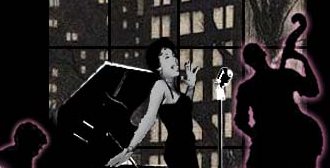Welcome toCafe SongbookInternet Home of the |
 |
 |
| Home || Songs || Songwriters || Performers || Articles and Blogs || Glossary || About Cafe Songbook || Contact/Submit Comment | |
| Search Tips: 1) Click "Find on This Page" button to activate page search box. 2) When searching for a name (e.g. a songwriter), enter last name only. 3) When searching for a song title on the catalog page, omit an initial "The" or "A". 4) more search tips. | |
| (Portions of this page have not yet been completed. Thank you for your patience.) | |||
Pick Yourself Up |
|||
|
|
|||
Written: 1936 |
Music by: Jerome Kern |
Words by: Dorothy Fields |
Written for: Swing Time |
| Page Menu | |||
| Main Stage || Record/Video Cabinet || Reading Room || Posted Comments || Credits | |||
On the Main Stage at Cafe Songbook | |||
| A Cafe Songbook "twofer": Mel Torme and Diana Krall | |||
Mel Torméperforming "Pick Yourself Up"at The Ambassador Auditorium in Pasadena, California, with John Colianni on piano (1994) --
More Performances of "title" |
|||
|
Diana Krall performing "Pick yourself Up" Olympia Theater, Paris, Find more performances of "Pick Yourself Up" on video |
||
Cafe Songbook Reading Room"Pick Yourself Up" |
|||||||
| About the Movie Swing Time and the Origins of the Song | |||||||
|
Swing Time, directed by George Stevens with a script by Howard Lindsay and Allan Scott is the sixth Astaire-Rogers movie and the first to be have all the songs written by the team of Jerome Kern (music) and Dorothy Fields (lyrics).
The movie is the story of how John "Lucky" Garnett (Fred Astaire), a dancer and gambler, meets and falls in love with Penny Carroll (Ginger Rodgers) a dancing school teacher. Lucky is engaged to a wealthy society girl in his home town in upstate New York, but when he fails to arrive in time for his own wedding, he is informed by his fiance's father that he can't marry his daughter (Betty Furness) until he proves himself a responsible fellow by earning $25,000. Lucky and his sidekick, magician "Pop" Cardetti (Victor Moore), take off for New York City in hopes of finding the money but instead Lucky finds and falls for Penny. The remainder of the movie is a series of comic episodes as Lucky and Penny get together but quickly fall apart. Most of these episodes provide the opportunity for a song and/or dance--some of the greatest in the history of film. The first of these takes place at the dancing school where Penny teaches. In order to get closer to her Lucky pretends to be a klutzy student but gets her fired instead. However, he manages to redeem Penny in the eyes of Mr. Gordon her Boss (Eric Blore) and himself in hers by demonstrating how much she has taught him. Penny resists saying, "No one could teach you to dance in a million years. Take my advice save your money." Nevertheless, Lucky insists on picking himself up, dusting himself off and trying once more. Suddenly Penny finds herself dancing with one of the greatest dancers of all time, which is enough to save her job, flutter her heart and thrill Mr. Gordon -- as well as us. Pop winds up fancying Mabel Anderson (Helen Broderick) the receptionist at the school and the four of them journey through the rest of the movie together having their share of misadventures; but finally the rule for comedy applies: all's well that ends well -- and, of course, it does.
|
||||||
 Astaire/Rogers Ultimate Collectors Edition (DVD includes all of the movies listed as well as many special features) |
The Ten Movies Co-starring 1) Flying Down to Rio (1933); 2) The Gay Divorcee (1934); 3) Roberta (1935); 4) Top Hat (1935); 5) Follow the Fleet (1936); 6) Swing time (1936); 7) Shall We Dance (1937); (8) Carefree (1938); (9) The Story of Vernon and Irene Castle (1939); 10) The Barkleys of Broadway (1949). |
||||||
| Critics Corner (This section is currently in preparation.) | |||||||
| Lyrics Lounge | |||||||
Click here to read the lyrics for "Pick Yourself Up"
The lyrics for "Pick Yourself Up" can be found in:
Click here to read Cafe Songbook lyrics policy. |
|||||||
| back to top of page | |||||||
Visitor CommentsSubmit comments on songs, songwriters, performers, etc.
Feel free to suggest an addition or correction. Please read our Comments Guidelines before making a submission. (Posting of comments is subject to the guidelines. Not all comments will be posted.) |
| To submit a comment, click here. |
Posted Comments on "Pick Yourself Up":
No Comments as yet posted |
| back to top of page |
Credits("Pick Yourself Up" page) |
Credits for Videomakers of custom videos used on this page:
Borrowed material (text): The sources of all quoted and paraphrased text are cited. Such content is used under the rules of fair use to further the educational objectives of CafeSongbook.com. CafeSongbook.com makes no claims to rights of any kind in this content or the sources from which it comes.
Borrowed material (images): Images of CD, DVD, book and similar product covers are used courtesy of either Amazon.com
Any other images that appear on CafeSongbook.com pages are either in the public domain or appear through the specific permission of their owners. Such permission will be acknowledged in this space on the page where the image is used.
For further information on Cafe Songbook policies with regard to the above matters, see our "About Cafe Songbook" page (link at top and bottom of every page). |
The Cafe Songbook
| ||||
|
Performer/Recording Index
(*indicates accompanying music-video)
|
||||
Year
Notes: The Goodman Orchestra's recording of "Pick Yourself Up" is contemporaneous with the Gershwin's composition of the song for the 1936 movie Swing Time. The Birth of Swing documents the early days of the Benny Goodman Orchestra. with 71 tracks on this three-disc set. |
||||
| back to top of page | ||||
1956
Notes: This track originally produced for Verve vinyl by Norman Granz included Larry Bunker, vibraphone; Harry "Sweets" Edison, trumpet; Barney Kessel, guitar; Joe Mondragon, Bass; Paul Smith, piano; and Alvin Stoller, Drums. |
||||
| back to top of page | ||||
1961
: Notes: Capitol records suggested to Nat King Cole that he make an album with George Shearing, and Cole, even though a jazz pianist himself, must have recognized the value of having Shearing accompany him. The album has Ralph Carmichael conducting a string orchestra along with Al Hendrickson (guitar); Paul Horn, Wilbur Schwartz, Justin Gordon (flute, piccolo); Lloyd Ulyate (trombone); George Shearing (piano); Emil Richards (vibraphone); Al McKibbon (bass); Shelly Manne (drums); Carlos Vidal (congas); Nick Martinez, Luis Miranda (percussion). The tracks were recorded at Capitol Studios, Los Angeles, California from December 19-22, 1961, and the latest reissue of the album contains three bonus tracks from the session previously not included.
|
||||
| back to top of page | ||||
1961-62
Notes:"Ella Swings Brightly with Nelson is the obvious companion piece to Ella Swings Gently with Nelson, and the two albums are often repackaged together. Recorded in 1961, when Nelson Riddle was possibly the most popular bandleader in America (thanks to his classic string of albums with Frank Sinatra) and Ella Fitzgerald was widely considered the best female jazz singer in the world, this album shows the pair working at their respective peaks. Riddle had an undeniable gift for arrangements, and the perky charts here fit Fitzgerald's bubbly delivery and giddy scat solos like the two had worked together for decades" (from CD Universe Product Description). |
||||
| back to top of page | ||||
1962
Notes: During the early Sixties while Ella was recording "Pick Yourself Up" with Nelson Riddle -- the conductor and arranger with whom Sinatra had created some of his most memorable albums in the previous decade -- Frank was recording "Pick Yourself Up" with Neal Hefti. This was Sinatra's first project with with Hefti, "the talented composer/arranger who provided the Count Basie 'New Testament' band of the '50s with some of its classiest material. The word 'brass' is featured in the title, but one comes away from this excellently produced session with an impression of sinewy, shimmering reed charts; characteristic of the Basie band" (from CD Universe Product Description). |
||||
| back to top of page | ||||
1973
Notes: The two legendary violinists collaborated on six LPs of semi-improvised jazz duets of popular songs between 1973 and 1983. "Pick Yourself Up" originally appeared on the first album in the series, Jealousy --Hits of the Thirties
(Please complete or pause one |
||||
| back to top of page | ||||
1983
Notes: Dutch singer Rita Reys is accompanied by the Pim Jacobs Trio. |
||||
| back to top of page | ||||
1989 and 2005
Notes: Frigo is a fiddler who can hold his own with Grappelli as the Pizzarellis on guitar can with Django. "The Pick Yourself Up" track recalls the Grappelli/Menuhin recording above, as if the rhythms of the song have traveled over the generations from the feet of Astaire and Rogers to the fingers of these fiddlers and guitarists -- amazing no matter what the appendage.
(Please complete or pause one |
||||
| back to top of page |
| Home || Songs || Songwriters || Performers || Articles and Blogs || Glossary || About Cafe Songbook || Contact/Submit Comment | |
© 2009-2018 by CafeSongbook.com -- All Rights Reserved |




